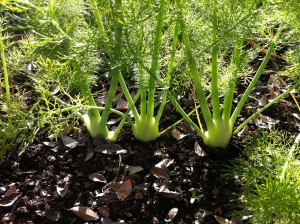 It was such a beautiful Sunday afternoon, I had to be in the garden for awhile. I felt a little guilty allowing myself this time, knowing that all of the lead teachers were likely working away on their progress reports. I then reminded myself that I put in my decades of writing progress reports, and it was probably in everyone’s best interest that I spend a little time reconnecting with the earth. Considering how infrequently I’ve been out there lately, the beds were in fairly good condition. The soil was more damp than usual, due to the extra moisture we’ve had lately and our trusty sprinkler system. I discovered a huge crop of volunteer lobelia sprouting up everywhere that will soon adorn the garden with a lovely blue. I was happy to see that five more lacinto kale seeds I planted in October have finally sprouted to join the other two that are already producing edible leaves. The peas are starting to blossom and soon we will have sunflowers again. January is a generous time in the garden.
It was such a beautiful Sunday afternoon, I had to be in the garden for awhile. I felt a little guilty allowing myself this time, knowing that all of the lead teachers were likely working away on their progress reports. I then reminded myself that I put in my decades of writing progress reports, and it was probably in everyone’s best interest that I spend a little time reconnecting with the earth. Considering how infrequently I’ve been out there lately, the beds were in fairly good condition. The soil was more damp than usual, due to the extra moisture we’ve had lately and our trusty sprinkler system. I discovered a huge crop of volunteer lobelia sprouting up everywhere that will soon adorn the garden with a lovely blue. I was happy to see that five more lacinto kale seeds I planted in October have finally sprouted to join the other two that are already producing edible leaves. The peas are starting to blossom and soon we will have sunflowers again. January is a generous time in the garden.
After spending over an hour pulling weeds, trimming cabbage leaves and removing the last dried up cinnamon basil plant, I wandered over to my first ever row of fennel to see how things were going. Fennel is such a beautiful plant with white translucent stalks touching the soil. Reaching out like fingers from the base of the stalk are green shoots with feathery leaves that remind me of how dill grows. I love how you can see sunlight shining through them like stained glass windows. There are various sizes of fennel plants growing in the row and the heartiest looking ones are those surrounded by extra space. One of the most painful parts of gardening for me is thinning out rows to make space for the remaining plants to grow. Whenever possible, I try to transplant those that happen to be growing in a too crowded place. Fennel, like carrots or beets, has such a large root that transplanting isn’t generally successful. The weaker plants all huddled together usually don’t make the cut. My only consolation is that they are consumed earlier than the rest of the crop or end up in the compost.
This idea of pruning, thinning out what no longer serves us, is something I think about frequently. As I grow older, I find myself practicing it in other areas of my life besides the garden. Foods that are not nutritious are no longer a part of my diet. How I spend my time and with whom is a carefully selected process. Even thoughts that are counter-productive to my well being are given as little energy as possible. In the end, the practice of living consciously is a lot like growing a garden; what we give space and time to holds the potential to nourish us the most.

I feel the same way……. loved your analogy!